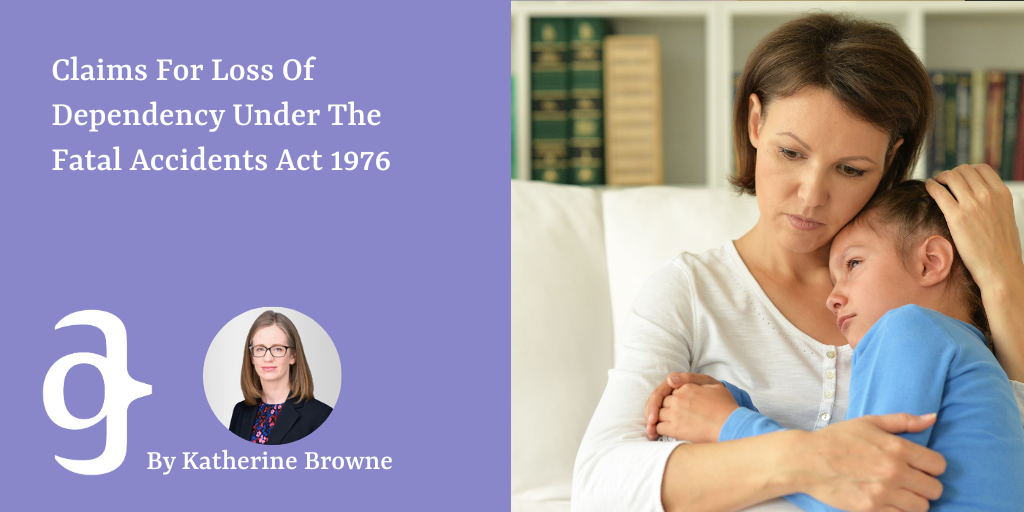Claims For Loss Of Dependency Under The Fatal Accidents Act 1976

The death of a loved one is life-changing and has a devasting emotional impact. From a purely practical perspective, in families where the deceased contributes financially and/or is responsible for running the household, it can also have huge financial implications.
While no sum of money can ever compensate for the life-changing impact of the loss of a family member, in certain circumstances, the law allows for the remaining family members to at least be supported financially after their loved one’s death, which brings a level of stability to the difficult circumstances.
Under the Fatal Accident Act 1976 (FAA1976), a claim can be brought on behalf of the dependants of the deceased for the financial and social impact that has occurred.
As my colleague Sana Bibi detailed in her recent blog on the possibility of making a claim on injuries leading to death, under S.1(2) of the FAA 1976 a claim can be brought by dependants for:
- Statutory Bereavement Damages
- Loss of financial dependency
- Loss of dependency on the deceased services
As in all areas of law, how the Court interpret claims for dependency will be fact specific. It is therefore important that any claim resulting from a major traumatic event such as the death of a family member is handled by an experienced legal team.
This way, a litigant can be confident that their claim will be correctly presented to the court in such a way as to ensure that their submissions are in line with the legal requirements, resulting in the court affirming that the dependants need to be supported for the long term.
Where a litigant has the support of an experienced legal team, that team will thoroughly investigate the minutiae of family arrangements prior to the deceased’s death, and what the future expectations of the family were.
This way, the maximum compensation can be awarded to financially support the dependants long-term following this life-changing event.
Who is a dependant?
A dependant is defined by s.1(3) of the FAA 1976. The list is limited to the deceased’s:
- Wife/husband/civil partner (including former married partner)
- Parent (or treated by the deceased as their parent)
- Child
- Child of spouse
- Brother, sister, aunt or uncle
- Any person who was living with the deceased for at least two years as if they were husband and wife/civil partners
- Unborn children on the expectation they would have been provided for after birth
The list is not perfect. It was prepared in the 1970’s and does not cater for the practicalities of modern families. For example, a foster child cannot be a dependant, nor can the child of an unmarried partner, despite being considered family members in all other respects.
Despite a number of legal challenges, the Court have remained strict in their interpretation of this list.
Establishing financial dependency
To be successful in any claim for the loss of financial dependency, a dependant must be able to show that they:
- had received financial support in the past, or
- had a reasonable expectation that they would be supported financially in the future.
The “reasonable expectation” does not have to be on the balance of probabilities (Davies v Taylor [1974] A.C. 207). This case established that there simply has to be a “substantial possibility.”
Interestingly, the breakdown of a relationship need not bar a claim for financial dependency. The question for the Court is: “was there a reasonable expectation of financial support from the deceased?”
Following CC v TD [2018] EWCA 1240, if a couple are in the process of a divorce, the court will look at any financial settlement which was to be agreed and limit damages to this. Conversely, if there is a breakdown in the relationship between co-habitees, the lack of an enforceable right to financial support will be taken into account.
The expectation of financial dependency can also be significant in the future. In AB v KL [2019] EWHC 611, the deceased had three adult sons who were still financially dependent. The Court awarded damages for money that would have been set aside for their first home and weddings.
Every personal injury solicitor will be familiar with the fairly recent case of Paramount Shopfitting Company Ltd v Rix [2021] EWCA Civ 1172, which in which the Court of Appeal gives further guidance on claims for loss of financial dependency. Though outside the scope of this blog, it is well worth a read as it also gives a useful ‘potted history’ of how the court has approached these claims.
Loss of dependency on the deceased’s services
The life-changing impact of the loss of the ‘homemaker’ should not be underestimated. In these cases, children and elderly family members lose their primary carer, and all the jobs the deceased did will stop, and this invisible thread which held the family together can result in it falling into disarray.
A claim for loss of dependency of the deceased’s services can also be included under the FAA 1976.
This can be anything that the deceased would have done for the dependant prior to their death. It may include care for dependants, running the house (shopping, cleaning, cooking etc), DIY and decorating and where relevant, dog walking. This is not an exhaustive list which is why your solicitor needs to be very detailed in their investigation.
Again, the fact of the dependency does not have to be provided at the time of death, but as with financial dependency, it must be reasonably expected in the future.
The Courts have interpreted what is to be awarded in a variety of ways:
- If these services have been paid for since the death, the Court will award the actual cost of replacing those services on a long-term basis, so long as the fact that this need may change over time has been taken into account.
- Where services have been replaced by a relative since death, the approach was previously to assess the cost of gratuitous care as per the usual principles i.e.; assessing the cost of comparable commercial care, and then applying a discount (as the care was provided for free). However, in the fairly recent case of Steve Hill v Witham [2021] EWCA Civ 1312, the Court of Appeal decided that lost services can be valued by applying the commercial rate of care with no discount. This is a clear deviation from how a care claim is assessed in standard personal injury claims.
- Where a family member gives up work to replace services provided by the deceased, courts have sometimes assessed a deceased service with reference to the litigant’s loss of earnings, as in Mehmet v Perry [1977] 2 All ER 529 and Cresswell v Eaton [1991] 1 All ER 484. However, sometimes the commercial rate of care, rather than the loss of earnings will be awarded. As previously stated, the Court will assess each case on its own facts.
* Disclaimer: The information on the Anthony Gold website is for general information only and reflects the position at the date of publication. It does not constitute legal advice and should not be treated as such. It is provided without any representations or warranties, express or implied.*

No comments